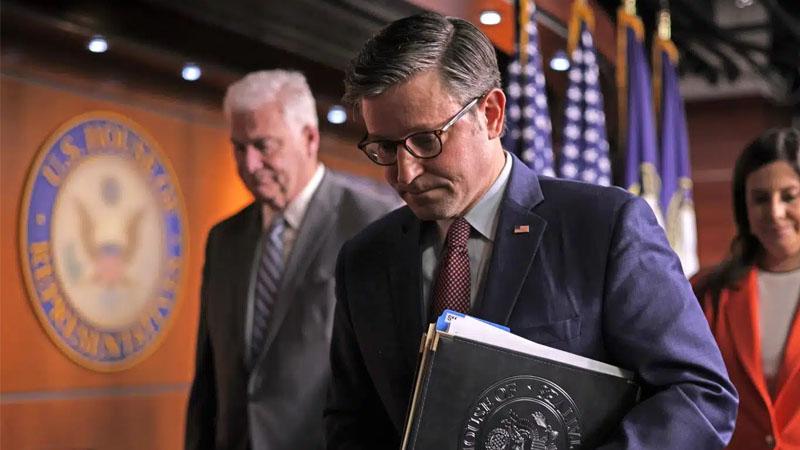House Speaker Mike Johnson, a Republican from Louisiana, finds himself entangled in unexpected party discord just weeks after securing the support of his caucus.
The roots of this challenge can be traced back to the historic ouster of then-Speaker Kevin McCarthy, a Californian Republican, and Johnson’s subsequent rise to power.
However, discontent is now brewing within the Republican ranks as Johnson faces opposition from an influential faction over a strategic move tied to a federal government surveillance tool, Conservative Brief reported on Saturday, December 9.
Following the removal of McCarthy, Johnson assumed the role of House Speaker amid promises of a recalibration within the Republican Party.
However, the recent turmoil stems from Johnson’s attempt to discreetly insert a short-term extension of a powerful federal government surveillance tool into the annual defense spending bill.
The move, aimed at navigating legislative priorities, has triggered resistance from an unexpected quarter – the House Freedom Caucus, known for its commitment to conservative principles.
Members of the House Freedom Caucus have openly opposed Johnson’s maneuver, seeing it as a departure from conservative principles.
This unexpected clash within the Republican Party highlights the Caucus’s vigilance in upholding constitutional principles and resisting government intervention.
The surveillance tool’s intricacies, designed for discreet inclusion in the defense spending bill, have become a point of contention, posing a significant challenge to Johnson’s leadership.
The clash within the Republican Party underscores the delicate balancing act Johnson must perform as House Speaker.
Navigating the complexities of legislating, particularly concerning key priorities like defense spending, is crucial. Simultaneously, maintaining unity within the party, especially with an influential faction like the House Freedom Caucus, becomes imperative.
The implications of this internal strife extend beyond the immediate legislative agenda, impacting the cohesion of the Republican Party in the broader American political landscape.
The fallout from McCarthy’s ouster, initially seen as a recalibration, now appears to have sown seeds of discord that threaten the party’s ability to present a united front.
Johnson’s leadership faces scrutiny as the party grapples with internal dissent over a seemingly strategic move.
The clash with the House Freedom Caucus raises questions about the party’s commitment to its conservative principles and the potential impact on future legislative priorities.
Understanding the intricacies of the federal government surveillance tool adds complexity to the unfolding drama. Initially intended for discreet inclusion in the defense spending bill, its short-term extension has become a focal point of contention.
The clash with the House Freedom Caucus exposes differing views within the party on issues of constitutional principles and limited government intervention, challenging Johnson’s ability to navigate internal divisions.
The ongoing discord within the Republican Party has broader implications beyond the immediate legislative agenda.
The party’s unity, a critical factor in navigating the complex landscape of American politics, is at stake.
The internal strife over the surveillance tool extension raises questions about the party’s ability to present a cohesive front, potentially affecting its standing and effectiveness in future political battles.
House Speaker Mike Johnson’s leadership is put to the test as discontent brews within the Republican ranks over a strategic move tied to a federal government surveillance tool.
The clash with the House Freedom Caucus underscores the delicate balance Johnson must maintain between legislative priorities and party unity.
The ramifications of this internal discord extend beyond the immediate issue, impacting the cohesion and effectiveness of the Republican Party in the intricate landscape of American politics.
Johnson’s ability to navigate these challenges will undoubtedly shape the party’s trajectory and influence its standing in future political endeavors.


